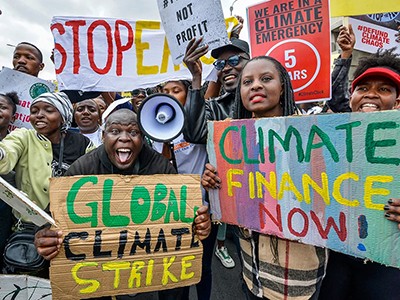For just a few more days, a window remains open for governments around the world to make their words matter. They have the chance to weigh in on deliberations of the International Court of Justice (ICJ), as it formulates a landmark judicial opinion on the responsibilities of states to mitigate climate change.
Last year, the United Nations requested an advisory opinion from the ICJ — the UN’s principal judicial organ in the Hague, the Netherlands — on two questions. What are states’ obligations under international law to protect the climate system and environment from anthropogenic greenhouse-gas emissions? And what are the legal consequences for states that, through acts or omissions, harm the climate system and environment?
As an environmental-policy scholar and president of the global non-governmental conservation organization WWF, I call on scientists and citizens around the world to back the court. They must urge their governments to supply the ICJ with the evidence and arguments it needs to speak boldly on protecting nature and the climate.
The deadline for submitting statements is 15 August. It was extended in May after the ICJ had received a record 91 statements the month before. The court is expected to open oral proceedings after the deadline and could arrive at its formal opinion late next year. The statements have not yet been made public, so it now falls to everyone to do what they can to help the judges to make their decision.
European ruling linking climate change to human rights could be a game changer — here’s how
I hope that governments will speak to the court, not just in their own national interests, but as advocates for a living planet where people and nature can thrive in harmony, now and into the future. The UN has asked the ICJ to consider the implications of climate change for present and future generations and for the precarity of climatically vulnerable states — such as the small Pacific island nation of Vanuatu, which led the campaign to seek such an opinion.
We at the WWF made such a point in our submission to the ICJ as a ‘friend of the court’. We hope that our urgent call for ambitious and immediate action will be echoed by others. We also hope that governments will recognize that protecting the climate system is impossible without also protecting the natural world.
Therefore, states’ legal duties must include protecting and restoring biodiversity, which is itself necessary to securing a stable climate. It also means protecting human rights — encompassing the right to a healthy environment, to health and life and to an adequate standard of living, which includes access to clean food and water.
The need for immediate action is pressing. I’ve been an author on several reports of the Intergovernmental Panel on Climate Change, but I no longer need to use complex models to explain climate change to my neighbours. They can see it happening outside their windows.
Global emissions continue to rise. Last summer was the warmest in 2,000 years, and this summer might beat that record. We have just witnessed 12 consecutive months during which the global temperature was 1.5 °C warmer than pre-industrial times. Extreme weather, heatwaves, wildfires, floods, droughts and storms imperil human life and property on every continent, and place unbearable stresses on the natural world. I witnessed the 2022 floods in Pakistan and saw at first hand how climate disasters wreak unimaginable havoc on both people and nature.
Do climate lawsuits lead to action? Researchers assess their impact
Climate change poses an existential threat to human society and to the very natural systems that have nurtured human prosperity on this fragile planet. Around one million animal and plant species are at risk of extinction, and are disappearing at rates unprecedented in human history. The WWF’s Living Planet Report 2022 points out that half of the biomass of warm-water corals has already been lost and a 2 °C increase could lead to a loss of up to 99%.
Facing such catastrophes, a non-binding opinion by an international court seems like a drop in the ocean. But it can make a big difference. A strong opinion from the ICJ will reinforce the international climate-policy architecture. It will reduce legal ambiguity around states’ obligations, which often hinder climate negotiations and distract nations from focusing on actionable policy. At best, a clear and assertive opinion could open avenues for enforcing international climate commitments legally. The court’s opinion could empower people seeking a legal route for environmental justice. And it will amplify the voices of millions of scientists and citizens who are demanding strong ambition and action on climate and nature protection.
But the strength of the ICJ’s opinion will be shaped by the evidence and arguments submitted now. And we do not know where the balance of argument in them stands. Some nations might wish for a cautious approach. A few might minimize the urgency or deny the enormity of the impacts of climate change. Others might prefer a more parochial approach to domestic policy unencumbered by global responsibility.
Although the window of opportunity is closing fast, governments still have time to support the court. We call on them to join the WWF in recognizing a duty for countries to stop harming nature, and to apply the ‘polluter pays’ principle and compensate states, peoples and nature that have suffered damage because of greenhouse-gas emissions.
We cannot afford to keep failing this wondrous planet of ours.
Competing Interests
The author declares no competing interests.




